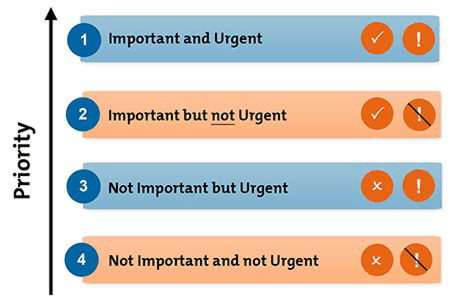Identifying stressors
)
Time stress
Time stress is one of the most common types of stress that we experience, particularly in busy educational settings. However, it is crucial to learn how to manage this type of stress so we can all work productively in a busy organisation.
Ways to reduce this stressor:
- Develop positive time management skills (e.g. to do list, action programmes, ensure clear and advance notice of deadlines.) This should help to reduce feelings exhausted, fearful of work amounts or getting caught up in urgent tasks which may actually have little impact of your overall work standards and efficiency. This should also help you to achieve more. This can also improve wellbeing, as you will feel you are completing and achieving tasks.
- Know your own stresses. Be self aware of your own lifestyle and timetable so you are plan tasks in appropriate and manageable chunks, e.g. avoid having heavy workloads at times when you know you may struggle completing them. School leaders can ensure major tasks are split across the academic year and workload considerations are reviewed so tasks are manageable.
- Be effective and efficient by focussing on impact. Make sure the tasks that you prioritise will be the ones that help you achieve your goals and objectives, so you are spending more time on the actions that will impact you the most. Consider how to balance urgent and important tasks through prioritisation, so you know what needs to be done and what you can safely put off. You could share with staff Eisenhower’s Urgent / Important principles to help them consider how to prioritise work.

- Create more time for yourself. What time of the day are you most focused – early bird or night owl? Do you work better when the school is quiet? Try to focus and prioritise important tasks at times of the day where you are at your peak and able to concentrate as this will help you be more efficient. Less important tasks can then be left to times when your energy levels or concentration span may be lower.
- Be prepared to politely say “no” if you just do not have the capacity to do the task.
Anticipatory Stress
Stress concerning upcoming and future events. It can be specific to an event (a particular deadline for a report, parents evenings, end of year reports, performance management etc) or more vague regarding a sense of dread or build up worrying that something will go wrong (such of statutory assessment periods or trying new teaching strategies.)
Ways to reduce this stressor:
- Recognise that this stress is a fear of the unknown. Things might not happen how you ‘think’ they will.
- Try mindful techniques such as meditation and positive visualisation to imagine the situation going well and help develop your focus and concentration on what is happening in the ‘now’ rather than worrying about the future.
- Know your own fears. Anticipatory stress can be linked to a fear of failure, so building self-esteem and confidence in staff is important. Encourage role playing potentially stressful situations, to remove some of the fear and encourage positive comments to help build confidence.
- Develop contingency plans. Know what you could do if something you plan doesn’t work. This can also help you to get an idea of how things might work out in the future. This can help to reduce that fear of failing and allow you to feel more in control.
Situational Stress
Often appears suddenly, with situations that you have not anticipated or prepared for. It can often be situations involving conflict, anxiety or a feeling of a loss of position.
- Develop self-awareness. Recognising your own automatic reactions to situations such as how you physically or emotionally act or respond when you are under pressure e.g. stomach feeling in knots, not knowing what to say, feeling anxious. In doing this, you can learn how to cope in these situations more effectively and manage the symptoms from your automatic responses.
- Learn conflict resolution skills. Learning ways to deal with pressurised and difficult situations can help you feel more in control and be more prepared to manage situations when they occur.
- Manage your emotions. Everyone reacts differently to stress, so knowing how you react can be helpful. It can also help you to cope more effectively with negative emotions like anger, frustration, anxiety and unhappiness if you can manage these more effectively.
Encounter Stress
Encounter stress links to people and worrying about interactions with individuals or groups of people. This can lead to feelings such as feeling overwhelmed or drained.
- Get to know each other. When you are more aware of yourself and the people around you, you become more aware of their dispositions and responses so you are more able to predict responses.
- Develop greater emotional intelligence. By recognising and understanding the emotions, wants and needs of yourself and others, you can become more skilled in your interactions.
- Know when you reach your limits. When psychologically you begin to reach a point where the encounter stress is increasing, try to change the situation. It is also important to try to take a break from encounters, so try going for a short walk, change the environment or practice deep breathing exercises.
- Develop your empathy skills. Understanding other people’s perspectives can help you be more aware of how you communicate and interact with them. You can also use this information to help prepare yourself for conversations, beforehand, so you feel more in control.


)
)
)
)
)
)
)
)
)